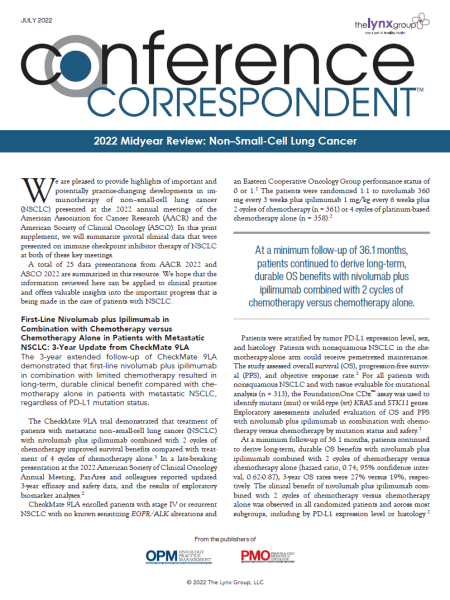Even with a high crossover rate, cemiplimab monotherapy significantly improved survival outcomes compared with chemotherapy in patients with advanced NSCLC whose tumors express PD-L1 ≥50%.
Cemiplimab (Libtayo) is a PD-1 blocking antibody indicated for the treatment of patients with metastatic cutaneous squamous-cell carcinoma (CSCC) or locally advanced CSCC who are not candidates for curative surgery or curative radiation. EMPOWER-Lung 1 is a multicenter, open-label, global, phase 3 clinical trial of cemiplimab in patients with treatment-naïve stage IIIB, IIIC, or IV squamous or nonsquamous NSCLC with PD-L1 expressed in ≥50% of tumor cells.1
Patients who enrolled in EMPOWER-Lung 1 were randomized to receive cemiplimab (350 mg IV every 3 weeks) or chemotherapy. Investigators were able to choose the chemotherapy regimen.1 Crossover from chemotherapy to cemiplimab was allowed following disease progression. The primary end points of EMPOWER-Lung 1 were OS and PFS based on blinded assessment by an Independent Review Committee.1 A prespecified interim analysis was performed after half of the survival events occurred.1 Data are presented for 2 populations: full intention-to-treat population and PD-L1 ≥50% intention-to-treat population.1 The latter comprised only patients with PD-L1 ≥50%.1 The data cutoff was March 1, 2020.1
After median follow-up of 13.1 months in the full intention-to-treat population, median OS associated with cemiplimab was 22.1 months (N = 356; 95% CI, 17.7-not evaluable) compared with 14.3 months (95% CI, 11.7-19.2) for chemotherapy (N = 354; HR, 0.68; 95% CI, 0.53-0.87; P = .002).1 The median PFS associated with cemiplimab was 6.2 months (95% CI, 4.5-8.3) compared with 5.6 months (95% CI, 4.5-6.1) with chemotherapy (HR, 0.59; 95% CI, 0.49-0.72; P <.0001).1
After median follow-up of 10.8 months in the PD-L1 ≥50% intention-to-treat population, median OS was not reached for cemiplimab (N = 283; 95% CI, 17.9-not evaluable) compared with 14.2 months (95% CI, 11.2-17.5) with chemotherapy (N = 280; HR, 0.57; 95% CI, 0.42-0.77; P = .0002).1 Median PFS was 8.2 months (95% CI, 6.1-8.8) with cemiplimab compared with 5.7 months (95% CI, 4.5-6.2) with chemotherapy (HR, 0.54; 95% CI, 0.43-0.68; P <.0001).1 The crossover rate to cemiplimab was 74%.1
In the full intention-to-treat population, cemiplimab was associated with a higher response rate (36.5%) compared with chemotherapy (20.6%), a longer median duration of response (21.0 months vs 6.0 months), and lower rates of grade ≥3 AEs regardless of attribution (37% vs 49%).1
EMPOWER-Lung 1 demonstrated that first-line use of cemiplimab monotherapy significantly improved OS and PFS compared with chemotherapy in patients with advanced NSCLC, in all patients and the subset of patients with PD-L1 ≥50%, despite a high crossover rate from chemotherapy to cemiplimab.1 Researchers concluded that these findings support consideration of cemiplimab as a new first-line treatment option for patients with advanced NSCLC.1
Reference
1. Sezer A, Kilickap S, Gümüş M, et al. EMPOWER-Lung 1: phase III first-line (1L) cemiplimab monotherapy vs platinum-doublet chemotherapy (chemo) in advanced non-small cell lung cancer (NSCLC) with programmed cell death-ligand 1 (PD-L1) ≥ 50%. Ann Oncol. 2020;31(suppl_4):S1142-S1215.

